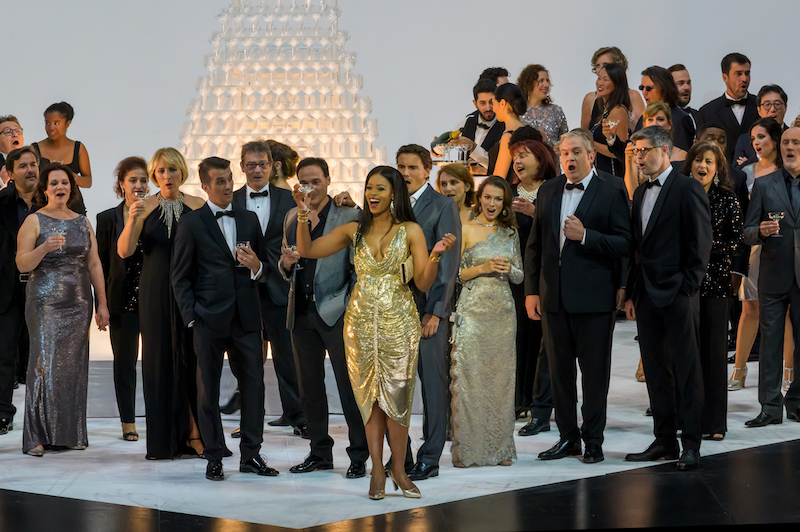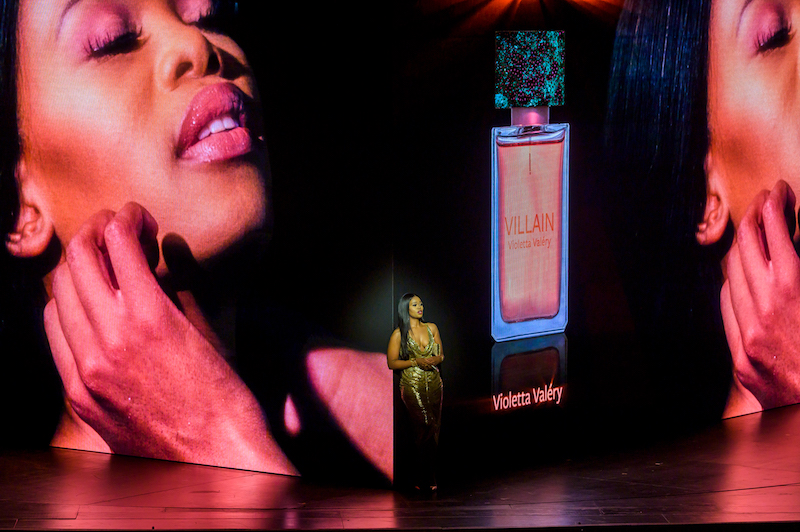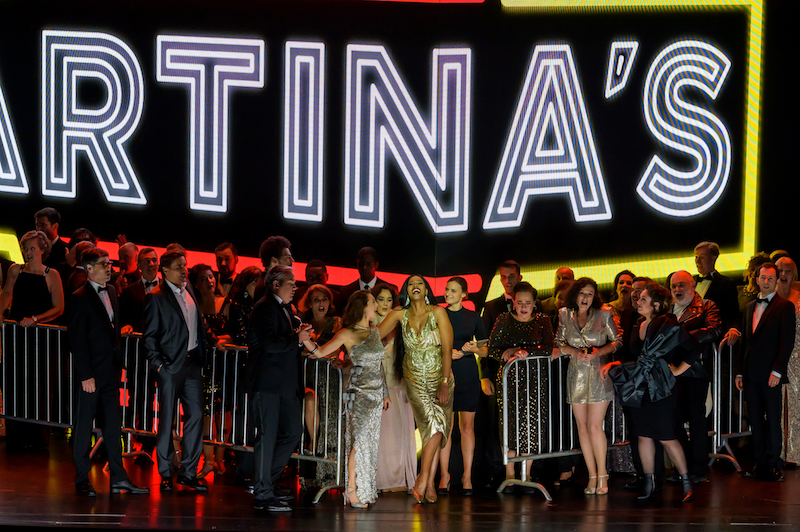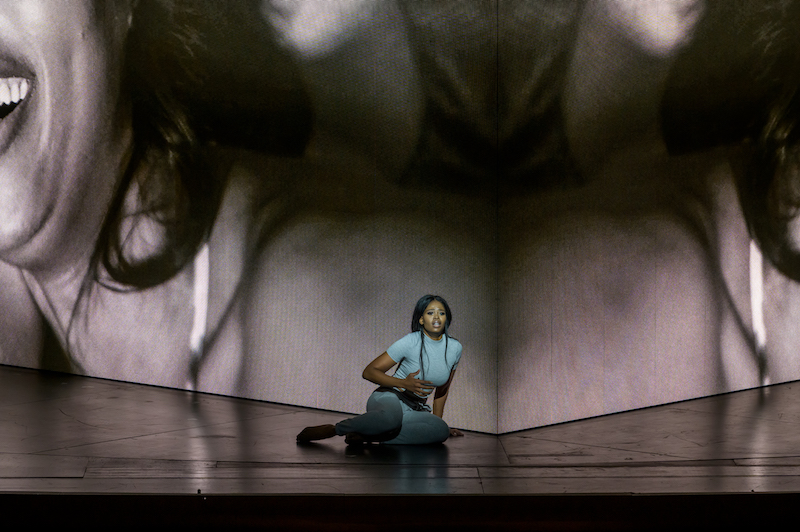Before we see Violetta Valéry in her slinky gold dress, before she sings a note, we see her portrait, the avatar of her Instagram account. Writ large on revolving screens (video design by Zakk Hein), we see streams of emojis whooshing by, adulation from her 147 million followers. We see the selfies she posts with her doctor to reassure her fans that she is on the mend following an illness and ready to grace the most fashionable Parisian nightclubs with her high-cheekboned duckface. We are also privy to her private exchanges, scrolling through her texts, emails and bank statements.
 Pretty Yene as Violetta and cast members in La Traviata. Photograph © Charles Duprat
Pretty Yene as Violetta and cast members in La Traviata. Photograph © Charles Duprat
Simon Stone has installed the latest updates in his La Traviata, where the demi-monde has gone decidedly mainstream. He has given Verdi’s tragic courtesan a drastically contemporary makeover, transforming her into a VIP blogger and influencer to rival Beyoncé or Kim Kardashian. For his fourth opera production, the young Australian director has turned away from creating a Traviata for the ages, opting for a Traviata saturated with the right here and right now, depicting the zeitgeist – the new rituals of courtship, the addiction to validation of strangers – with uncomfortable accuracy.
I don’t blame him. Opera is, after all, one of the most voyeuristic art forms both on and off stage; one only has to observe the who’s who parading around the opulent marble staircase of the Palais Garnier during the intermissions of this production, sold out since the European summer, the first Traviata seen at Garnier in 12 years. Charles Garnier designed his grand staircase precisely for Violetta Valéry’s generation to see and be seen. He couldn’t have known he was designing it to be instagrammed, which was naturally the first thing I did before taking my seat.
 Pretty Yende. Photograph © Charles Duprat
Pretty Yende. Photograph © Charles Duprat
Australian designer Bob Cousins’ sets are startlingly faithful to Parisian nightlife for twenty-somethings, right down to the last few months’ evolutions. Pretty Yende’s Violetta is whisked away from an exclusive party by her white steed (AKA Uber). She treats herself to a post-party kebab beneath, very precisely, the gilded Joan of Arc statue at Place des Pyramides, with a few drunkards and a discarded red ‘Jump’ Uber bicycle populating the street (do I smell product placement? A sponsored post?) A video billboard of Violetta’s eau de parfum campaign, ‘Villain’, looms large in the background. Once upon a time, Alfredo (Benjamin Bernheim) might have serenaded her underneath her balcony. Stone reminds us we don’t actually need to be there in person for the love duets; his interjections in Sempre libera take place via SMS from a co-working café. The rules of seduction have changed, and opera has to keep up.
The most intimate moments of the opera are the least glamorous or ripe for social media; after a bubbling, picture-perfect Brindisi, Violetta stumbles out into a back alley, where her Act 1 duet with Alfredo takes place among the dumpsters. ‘You’ll end up killing yourself, living like this’, he warns her. What can make this starlet change her life for someone who can offer neither wealth nor fame? ‘There’s no one in the world who loves you, except me’. In a sea of soulless ‘likes’, her galant suitor visited her every day during her illness, somehow falling in love with the person rather than becoming obsessed with the image.
Act Two’s secluded country setting, sparsely modernist except for a cow waiting to be milked and some grapes to be stamped, is less convincing, despite Cousins’ and Stone’s Australian roots. Even Paris Hilton has had a farm-girl phase, but I find it difficult to believe that this rural idyll is what would ruin Violetta financially – have you seen Paris apartment prices lately? These incongruities did not detract from the intensity and the complex cocktail of emotions in the central duet between Violetta and Alfredo’s father, Germont (Jean-François Lapointe).
 Pretty Yende and cast. Photograph © Charles Duprat
Pretty Yende and cast. Photograph © Charles Duprat
The courtesan’s return to the demi-monde and staged betrayal of her lover lead her to a sort of VIP fancy dress orgy, letting loose the imaginations of Cousins and Australian costume designer Alice Babidge to dress the entire chorus in the most depraved attire possible. Alice in Wonderland meets Eyes Wide Shut, with sex acts lit up in neon and some playful S&M for Violetta’s entourage. In her Act Three death scene, in stark contrast, she is caught between the sterile hospital ward and memories of her glory days and loving moments with Alfredo – relived in selfies and video footage, of course.
This production marks a long-awaited role debut for the South-African soprano Pretty Yende, who clearly relished her onstage celebrity, for which she received an enthusiastic standing ovation. Although her phrasing and timbre lacked the finesse and brilliance we expect from a Brindisi or a Semper libera, her dramatic tones reveal a deeper and warmer reading of the character in her final agonising moments as well as in the Act II duet with Germont. Violetta is ably and stylishly supported by her friend and fellow fashionista Flora (French mezzo-soprano Catherine Trottmann) and her valet Annina (Marion Lebègue).
The French tenor Benjamin Bernheim has sung Alfredo at La Scala and Covent Garden. His vocal credentials – bright and supple across his range – are in evidence throughout; if his actions and demeanour seem weak and restrained in the first act, he begins to bring dramatic form to his Act Two aria ‘Lunge da lei’, culminating in the unbridled passion and desperation that lead him to denounce Violetta in the Act II masked ball, ‘Ogni suo aver tal femmina’, supported by a responsive and incisive chorus.
 Pretty Yende. Photograph © Charles Duprat
Pretty Yende. Photograph © Charles Duprat
The Canadian baritone Jean-François Lapointe’s Germont is a particularly rigid presence, the voice of reason no one wants to listen to. His burnished tones are often wonderfully choked with pathos. Under the baton of Italian maestro Michele Mariotti, the orchestra of the Opéra de Paris is limpid in rapid tempo choices, with ethereal strings and imposing brass in the final act.
Violetta’s status and success in a soul-crushing milieu is considered so normal these days that it may be hard to understand why she would be denounced for it. For an older generation, this La Traviata might not make a whole lot of sense. For me, it cut surprisingly close to the bone. #artimitatinglife.
This production, captured live from the Palais Garnier on September 21, will screen in Australian cinemas, November 15 – 20, as part of the Palace Opera & Ballet 2019/20 season. Details HERE











Comments
Log in to join the conversation.